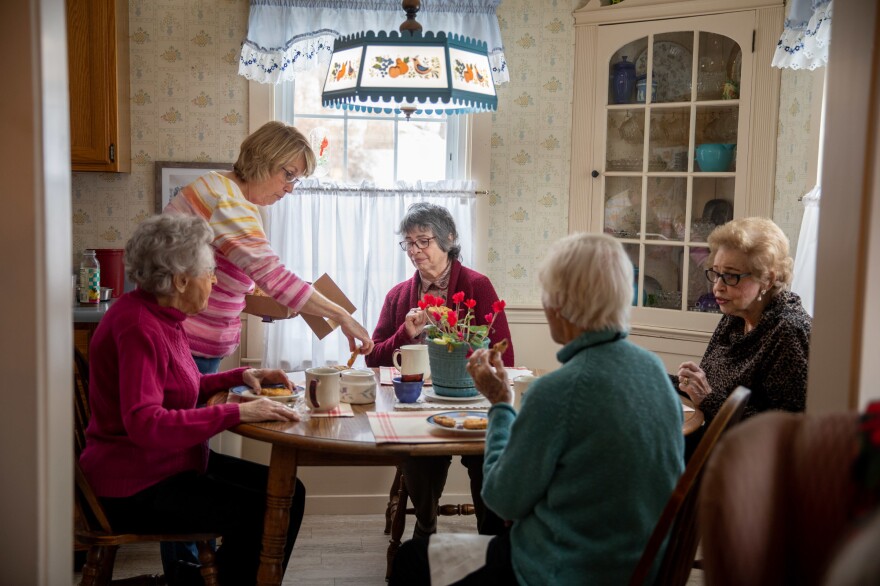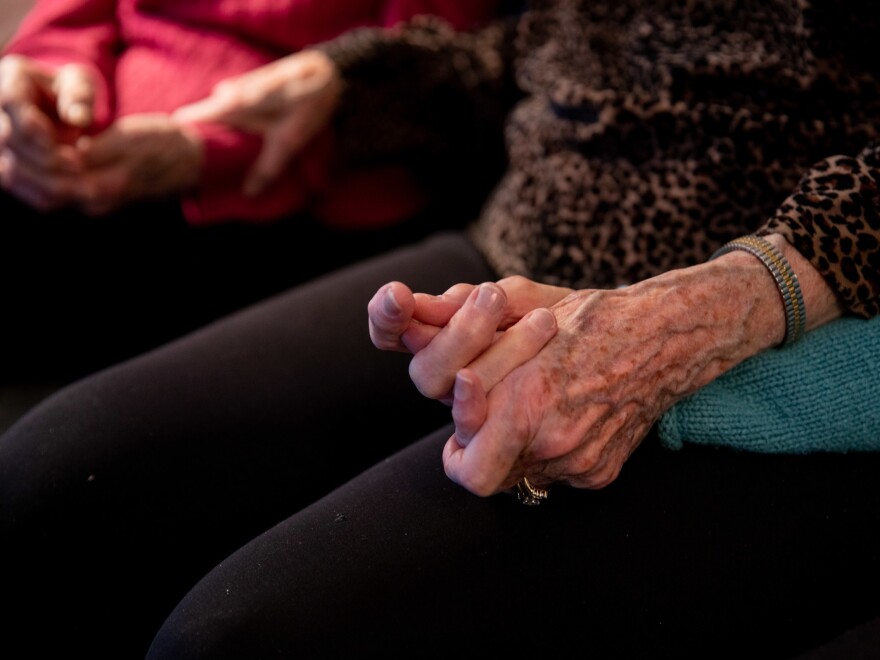And now for a story about three Dots. Not an ellipsis or a new discovery in the solar system or a location on a map. No, this is a story about three women named Dorothy, all born in 1919, who grew up together in the same hometown, celebrated their 100th birthdays this year and who still remain friends.
This interview is part of our series of conversations with Maine centenarians.

Back in 1919, Dorothy was the third most popular girl’s name, and the chance of living to age 100 was 1.9 percent. So imagine the odds that former classmates and longtime friends Dot Buchanan, Dot Murray and Dot Kern would still be living in Auburn, Maine, and, 10 decades later, meeting for tea.
“Looks like we made it,” Kern says.
“We have so far,” Buchanan says.
“Don’t you think that we look as though we’re going to make it?” Murray says.
Sitting on the sofa in Buchanan’s living room, the three great-grandmothers squeeze hands. Their hair is thinner and it’s more difficult for them to get around, but they say they find comfort in their extended families, their faith and in their unusual connection, which brings them together to reminisce a couple of times a year.
“We all went through the Depression and no one had any more than the other,” Kern says.
Growing up during the late 1920s and early ’30s, Dot Murray says economic times were tough, but everyone made do.

“We couldn’t spend much, that’s all,” she says.
Murray had a fondness for Depression-era pickle sandwiches — sweet pickles with mayonnaise on bread — and she loves socializing at family gatherings and parties with her friends. Buchanan recalls Murray as a striking drum majorette in the high school marching band.
“She had big boobs,” Buchanan says.
“I …” Murray says.
“You did,” Buchanan says, interrupting. “And you’d go back and forth and back and forth. And you were really very good.”
Kern is the youngest of the three.
“I’m just a kid. I don’t feel any older than I did when I was 16,” she says.
Kern is a graduate of Bates College who worked as a reporter for the student newspaper and then at the Lewiston Sun Journal, where she and her husband met. During World War II he served in the Army. They wrote letters to each other every day for four years.
Kern says after the war was over, he called to say that he was coming home and she should meet him at the bottom of their hill that night. But when the time came, Kern says she got lost in her excitement.
“And I walked right by him. And he hollered and said, ‘Dot!’ I must have been in seventh heaven and I thought, how could I have missed him?” she says.

Kern went on to earn a second degree in library science from Colby College and worked as a high school librarian, a job she loved, for 20 years. Murray had a bank job and later helped her husband run his business. And Buchanan was an executive secretary at the American Red Cross during World War II.
Buchanan remembers the sound of the teletype ticking off war casualties, always fearful that it could include the name of her husband, who was stationed in Hawaii, or someone else she knew.
Like both Kern and Murray, Buchanan was a working mother.
“After the war, that was when women were liberated and they started working, but I liked it. Everything I did I always liked,” she says.
All three women enjoy reading and music — Murray plays the piano by ear — and singing, although Kern says she was sorry to have to give up her participation in the church choir earlier this year. There was concern that she might take a fall.
All three are also guided by their faith.
“And you just wonder sometimes, why, why me, why am I living so long?” Murray says.
When the Dots get together they say they always ask each other the same question: “How are you feeling?” They all say they’re feeling fine, especially Murray.
“I don’t have an ache or a pain. I drive. I do everything, as I always have.” she says.
“Why do the police let you drive at 100?” Buchanan says.
“Because I haven’t had any accidents, they can’t stop me,” Murray says.
"Well, you're due! You're due," Buchanan says.
"I'm still an excellent driver," Murray says.
"I didn't say you weren't," Buchanan says.
Giving up driving has been difficult, the other two Dots admit, and both did so reluctantly. No one wants to lose their independence or be a burden to their families. That’s their No. 1 concern.
Getting to the advanced age of 100, they say, means giving up a lot. They’ve outlived husbands, friends, siblings and even several of their children. And they have some sage advice for the rest of us.
Kern says she’s been surprised by the passage of time.
“Time has gone fast. It doesn’t slow down and get drab. It goes fast.” she says.
Her wish is that everyone would slow down, pay attention to the planet and deal with climate change.
Buchanan yearns for tolerance.
“Accept other people for what they are,” she says. “Accept them for what they are because everybody’s not alike.”
Murray has a similar wish. She’s concerned about polarizing political views in the country and the direction she sees it headed.
“Get along,” she says, “Love one another.”
And then, glancing at Buchanan’s little dog Jody resting on the living room floor, Murray adds:
“You know, everyone should have a dog.”



